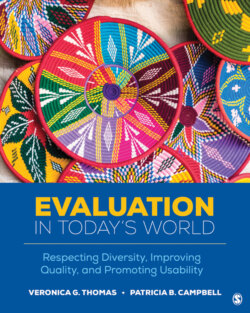Читать книгу Evaluation in Today’s World - Veronica G. Thomas - Страница 70
На сайте Литреса книга снята с продажи.
Reflect and Discuss: Self-Exploration
ОглавлениеConsider diverse cultural experiences that have led you to further “self” exploration. What did you learn about yourself that you were not consciously aware of prior to this self-exploration?
After reviewing the AEA’s (2011) Public Statement on Cultural Competence (available at www.eval.org/ccstatement) in full, discuss how exploring the “self” can improve one’s work as an evaluator.
In culturally incongruent settings, ethical issues can arise relative to the evaluator’s respect (or lack thereof) for local customs, values, and belief systems. Three types of ethics are particularly relevant in the evaluation of programs serving nonmajority and culturally diverse populations. These include procedural ethics, situational ethics, and relational ethics (Ellis, 2007; Guillemin & Gillam, 2004). Procedural ethics involve those mandated usually by institutional review boards to ensure that the study’s procedures adequately address the ethical concerns of informed consent, confidentiality, right to privacy, freedom from deception, and protection of participants from harm.
While institutional review boards certainly have tremendous value and are entrusted with ensuring the ethical conduct of research, scholars vigorously pushing for use of antiracist methodologies often cite problems with traditional institutional review boards’ ethics review procedures based in positivism, which separates thought from action and subject from object and assumes that research can and should be value free (Chavez, Duran, Baker, Avila, & Wallerstein, 2003). Further, it has been argued that institutional review boards generally give emphasis to assessing risks to individuals without paying attention to risk to communities (Minkler, 2004), a condition that has ethical implications for evaluations focusing on marginalized communities. Institutional review boards and the protection of human participants are covered in more detail in Chapter 12.
Situational ethics, or ethics in practice as it is sometimes referred to, include concerns involving the day-to-day unpredictable, often subtle, yet ethically important periods that arise while conducting research and evaluations. Situational ethics often reveal vulnerability, and the evaluator must decide what to do and how far to probe the situation at hand. Relational ethics, another type of ethics relevant to the evaluator, situates ethical action explicitly in relationships recognizing and valuing mutual respect, dignity, and the connectedness between the researcher and the researched and between researchers and the communities in which they live and work (Ellis, 2007).
